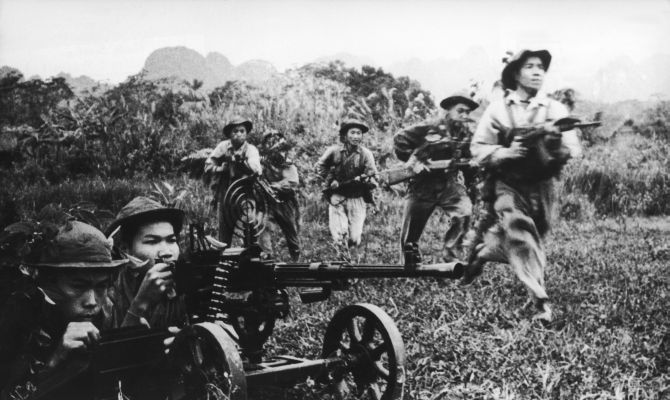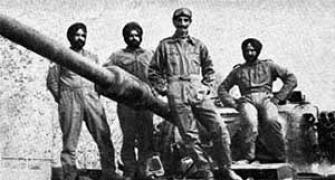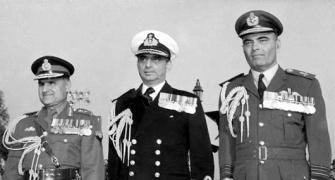
40 years ago, on April 30, 1975, Saigon fell to the North Vietnamese army, ending the Vietnam War.
Military historian Colonel Anil A Athale (retd) debunks myths about the Vietnam War which endure till today.
On April 29-30, 1975, 40 years ago, ended the epic struggle between Vietnamese nationalism and American armed might with victory going to tiny Vietnam.
The war lasted close to 10 years since the first major American formations landed in 1965. At its peak in 1966, the US had close to 400,000 troops there.
A combination of Viet Cong guerillas and North Vietnam's resilient regular army, backed by the Soviet Union and China, proved too much for the Americans who lost close to 59,000 soldiers in this conflict.
The Vietnamese losses were ten times more.
The Americans tried everything -- from massive bombing of North Vietnam (including prohibited napalm as well as chemical warfare agents like the defoliant 'Agent Orange') and escalated the war to neighbouring Laos and Cambodia.
Nothing worked. Finally a peace accord in Paris in January 1973 facilitated American troops to withdraw by March that year. The American hope that its proxy South Vietnamese army would withstand North Vietnam's offensive proved illusory and the war ended when the South Vietnamese capital city of Saigon fell to North Vietnamese regular forces on April 30, 1975.
The American loss of Vietnam in 1975 marked the end of American military domination of the world since 1945. Combined with the delinking of the dollar from gold ($34 to an ounce of gold) and the end of the 'fixed exchange rate,' this was seen as the beginning of the end of the American era.
The interpretation of this event has spawned many myths that continue to have an effect on world politics. 'Vietnam' has become an adjective as well as a verb -- the Americans, for instance, were driven by the passion to do a 'Vietnam' on the Soviet Union when that country invaded Afghanistan in 1979.
The Vietnam mystique, in the popular imagination, is seen as an instance of rag-tag guerillas defeating a mighty superpower. Seen in a series of successful insurgencies, the image of the 'invincible guerilla' captured the public consciousness. Some saw in this a rise of a Third World country defeating an industrial power of the First World. Communist sympathisers saw this as the inevitability of the ultimate triumph of 'Socialism.'
The reality is very different from these commonly held perceptions. Saigon fell not to some rag-tag guerilla force, but North Vietnam's well-oiled war machine, armed with Soviet tanks and guns. Ever since the dawn of the industrial era, the power of conventional armies armed with modern weapons is such that no agrarian society can withstand it.
Vietnam was fully backed by the industrial might of the Soviet Union and China (to a lesser extent). With this support, at the level of fighting infantry battles, the Vietnamese were an equal match to American or South Vietnamese soldiers.
It was greater skill, motivation, morale and the skillful use of the terrain (jungles, swamps and paddy fields) that led to the North Vietnamese victory. For this to happen, Soviet support was essential.
While the Viet Cong guerillas played a major role in lowering the morale of its opponents, the final blow was delivered by the regular Vietnamese army. In another war, a few years before, in Bangladesh, Mukti Bahini guerillas played a prominent role, but the knockout punch was delivered by the Indian Army.
Henry Kissinger in his White House Years lamented that the Vietnam war, within a few years of the Bangladesh war, showed American military might in bad light and worried about the impact it would have on other similarly armed US allies.
This lesson of the inadequacy of guerilla forces was brought home forcefully in Afghanistan when the Najibullah government survived a full two years after the withdrawal of the Soviet forces. The end came only when major formations of Afghan forces under warlord General Rashid Dostum switched sides to the Taliban. The North Vietnamese gained an easy victory because the regular South Vietnam forces changed sides or melted away.
The myth of the 'invincible guerilla' persists from the jungles of Chhattisgarh where Naxalite rebels wage war against the Indian State, in Kashmir where local and Pakistani guerilla fighters do likewise, to Palestinian mujahids and Syrian insurgents, causing untold misery.
Under the thrall of this myth, insurgents from Kashmir to Bastar continue to dream of victory. It is an iron law of modern warfare that unless regular military forces crumble, the guerillas on their own can never win.
Neither the Israeli defence forces nor the Syrian regular army or for that matter the Indian Army is likely to follow the South Vietnamese example. Violent movements depending on guerilla warfare alone to achieve its objective live in a fool's paradise like the Liberation Tigers of Tamil Elam did till it was decimated by Sri Lankan forces in May 2009. In a way, these tragedies are a result of the incorrect understanding of 'why' Vietnam happened.
As to Vietnam being an ideological battle between 'Socialism' and 'Capitalism,' the less said, the better. Less than 15 years after the Vietnam War, Communism collapsed in the Soviet Union and was modified beyond recognition in China.
Less than four years after the Saigon victory, two brotherly Communist countries -- China and Vietnam -- fought a border conflict. Vietnam is now turning into a market economy and a capitalist system, ready to befriend the Americans.
The Vietnam victory was a triumph of Vietnamese nationalism, pure and simple.
Another convenient myth of the victory of a Third World country over a superpower was in reality a contest between Soviet and American arms, and not a contest between a Third World country and an industrialised nation.
Even in Afghanistan, the Afghan mujahideen forced the Soviet troops out by fighting with the latest American weapons, and not local muzzle loaders.
Vietnam was a multi-layered conflict. It was a proxy war by the Communist bloc to spread its influence. The Americans were concerned with their 'domino theory.' Both sides claimed the war as a fight for 'liberation from imperialism,' in defence of the free world.
For the Vietnamese, it was a continuation of their war of liberation. Each of these factors operated simultaneously.
The greatest impact of the Vietnam debacle was on the United States. As late as 1991, when I visited the US and had discussions with think-tanks in Washington, DC, I was politely told to avoid mention of Vietnam. In the subsequent American conduct of war, the memories of Vietnam and the need to avoid the mistakes made in Indo-China have been a constant factor.
Immediately following the Vietnam debacle, the US engineered minor conflicts to claim victory. A postage stamp sized country like Grenada was invaded and the operation touted as a great military triumph. Even the decision to avoid going to Baghdad in 1991 was prompted by this fear of getting involved in fighting land wars.
Such was the American fury over its loss to Vietnam that it found it expedient to support genocide in Cambodia by the Pol Pot regime just to spite the Vietnamese-supported alternative.
Part of the American dilemma is to have deluded itself on Vietnam. A nationalist assertion was seen as a global Communist conspiracy. The 'domino theory' that the loss of Vietnam would lead to a loss of other countries proved false.
If one looks at the history of counter-insurgency and counter guerrilla wars of the last several decades, one can clearly discern a tipping point -- an event or occurrence that changed the ultimate outcome in favour of one or the other side as the result of a perception of a no-win by one side.
In the case of the Vietnam war, that point was the Tet Offensive in January 1968.
Coinciding with the Vietnamese New Year, during which both sides usually observed a cease-fire, Vietnamese guerrillas launched a successful attack on all the provincial capitals in South Vietnam, Saigon and Hue, the ancient capital, the two biggest cities in South Vietnam.
The attack shook the Americans by its scope and breadth. The earlier American optimism gave way to pessimism and domestic opposition to the war mounted.
Militarily, the Vietnamese guerrillas suffered huge casualties. American forces quickly regained the cities, but the perception that they could not win the war took root, both among the American military and the public. After Tet, it was a matter of time before the Americans withdrew from Vietnam.
Vietnam also offered another military lesson: Superior air power alone cannot guarantee victory against a tenacious enemy. The US used more bomb tonnage in the Vietnam war than it did in World War-II (including the two atom bombs). Despite this it failed to subdue Vietnam. There is no substitute for ground troops in war.
Wearing down the enemy and lowering morale are common to all forms of warfare. But in revolutionary war and in the Maoist conception, it is the loss of morale that leads to the defeat of the enemy's armed forces and victory.
In the classical concept, destruction of armed power leads to a collapse of morale and eventual victory. The Americans could not fathom this subtle difference and paid the price. The Vietnam War was lost not in the paddy fields of the Mekong Delta, but in American living rooms.
The unprecedented television coverage brought the horrors of the war right into American homes. The evaporation of public support for the war ultimately led to military disengagement.
Another underplayed issue of the Vietnam war is the role religion played. Jomini, the French military historian of the Napoleonic era, devoted a chapter to what he called the 'wars of opinion.' He identified religion as the earliest form of ideology for war: 'Religion can be a powerful ally, for it excites ardour of the people and also creates a party.'
In the 20th century, the Korean War and the Vietnam War had subtle undertones of religious conflict. In Korea and Vietnam, the regimes supported by the Christian West were initially dominated by their co-religionists. But such is dominance of the West that this issue is seldom mentioned.
The Americans found the shadowy Dr Tom Dooley to conduct propaganda against Vietnam and accuse it of atrocities on Christians. Dr Dooley was an instrument in the hands of the (so-called) Vietnam lobby, a group of public relations executives, former Socialists turned anti-Communist, shadowy military figures and Central Intelligence Agency operatives.
These folks, none of whom were Catholic, ardently desired a Catholic figure who might be a bridge from American non-sectarian anti-Communism to the fiercely Catholic leader in South Vietnam, Ngo Dinh Diem. Thus began the American involvement in Vietnam.
Forty years after the Vietnam war, its lessons ought to be learnt by nations as well as insurgents. Insurgents must know the limits of guerilla war and States must be wary of losing the battle of perception lest a war incites domestic opposition and becomes unviable.
Military defeat is a consequence and not the cause of this loss of the battle for the public mind. In the 21st century the management of perception has climbed to the top of the military agenda.
Image: Viet Cong troops during the Vietnam War, 1968. Photograph: Getty Images
Colonel Anil A Athale (retd) is the Coordinator, Indian Initiative for Peace, Arms-control & Disarmament, a Pune-based think-tank.
REDIFF RECOMMENDS









